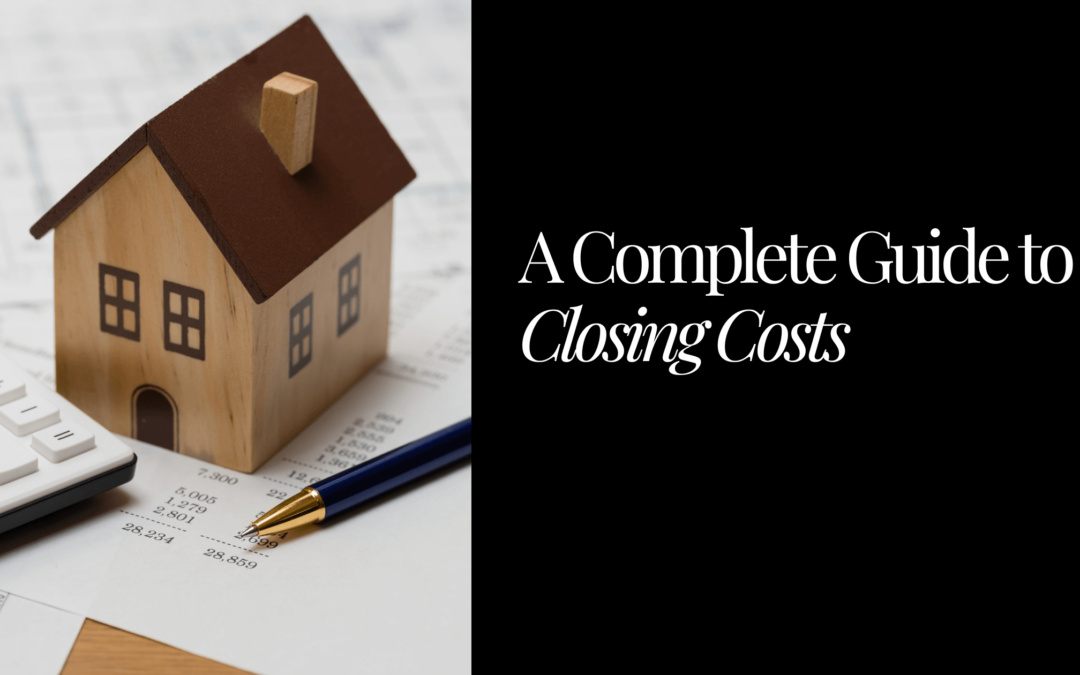A Complete Guide to Closing Costs
Are you a first-time homebuyer wondering about the additional costs involved in purchasing a home? Closing costs can be a significant expense, and it’s essential to understand what they entail before making a home purchase. In this guide, we’ll explore the three main categories of closing costs that you’ll incur: Lender Fees, Insurance Fees, and Title Fees.
We will also break down each of these categories of closing costs and provide tips and tricks for reducing them. Our goal is to help you navigate the home buying process with confidence, knowing exactly what to expect when it comes to closing costs. Whether you’re a first-time homebuyer or a seasoned real estate investor, this guide is a must-read before making your next home purchase.
1. Lender Fees
Lender fees are charged by the lender to cover the costs of processing your loan. These fees can include application fees, origination fees, and underwriting fees.
(a). Application fees are charged to cover the costs of processing your loan application. These fees typically range from $50 to $300.
(b). Origination fees are charged to cover the costs of underwriting your loan. Underwriting is the process of evaluating your loan application to determine whether you are eligible for a loan and what the terms of your loan will be. Origination fees typically range from 1% to 2% of the loan amount.
(c). Underwriting fees are charged to cover the costs of evaluating the risks involved in lending you money. These fees typically range from $100 to $500.
2. Insurance Fees
Insurance fees are charged to protect the lender and the buyer in case there are any problems with the property. These fees can include title insurance, property taxes, homeowner’s insurance, and private mortgage insurance.
(a). Title insurance protects the lender and the buyer in case there are any problems with the title to the property. Title insurance is typically required for all home purchases. The cost of title insurance varies depending on the state and the purchase price of the home. The buyer and seller pay title insurance fees at closing.
(b). Property taxes are due on the property each year. The buyer is responsible for paying property taxes for the year in which the sale takes place. The seller is responsible for paying property taxes for the previous year. The amount of property taxes due varies depending on the state and the assessed value of the property. You typically pay the taxes due for the sale year in addition to 12 months ahead to build your escrow account for automatic payments.
(c). Homeowner’s insurance protects the buyer’s investment in the home in case of damage or loss. Homeowner’s insurance is typically required for all home purchases. The cost of homeowner’s insurance varies depending on the state, the type of home, and the coverage amount. You typically pay the insurance due for the sale year in addition to 12 months ahead to build your escrow account for automatic payments.
(d). Private mortgage insurance (PMI) is due on all government backed traditional loans when your down payment is less than 20%. This insurance protects the bank in the event the buyer defaults on the loan. This fee will drop off once you pay 80% of your loan. Your PMI payment will be included in your monthly mortgage payment to your lender. Some loan types will require PMI to be paid up front at closing, so please discuss this with your Lender.
3. Title Fees
Title fees refer to costs associated with the title of the property you’re purchasing. These fees include recording fees, notary fees, title insurance, and escrow fees. Title insurance is particularly essential as it protects you from any future disputes over the ownership of the property. Understanding these fees can help you budget and plan accordingly for your closing costs. These fees can include recording fees, notary fees, title insurance, and escrow fees.
(a). Recording fees are charged to record the deed to the property with the county clerk’s office. The recording fee typically ranges from $5 to $20.
(b). Notary fees are charged to have the deed to the property notarized. The notary fee typically ranges from $10 to $50.
(c). Title insurance protects the buyer’s interest in the property in case there are any problems with the title. Title insurance is typically required for all home purchases. The cost of title insurance varies depending on the state and the purchase price of the home.
(d). Escrow fees are charged to cover the costs of holding the buyer’s down payment and closing costs until the sale is finalized. The escrow fee typically ranges from 1% to 2% of the purchase price of the home.
Tips for Saving Money on Closing Costs
There are a few things you can do to save money on closing costs:
(a). Shop around for a lender. Different lenders have different fees, so it’s important to compare rates and fees before you apply for a loan.
Please keep in mind that a discount Lender is not always the best option, as you want to work with someone that delivers excellent service, will not risk your loan closing, and gets to know your needs at a deeper level.
(b). Ask your lender about any closing cost assistance programs that may be available. Some lenders offer programs that can help you with the costs of closing on your home.
(c). Consider making a larger down payment. A larger down payment will lower your loan amount and the amount of closing costs you’ll need to pay.
(d). Be prepared to negotiate with the seller on closing costs. The seller may be willing to pay some or all of your closing costs.
Conclusion
Closing costs are a significant expense of buying a home. It’s important to be aware of these costs and to do your research to find the best way to save money.
Sincerely,
Your Oregon Realtor®


